| Second Darnussian Civil War | |||||||
|---|---|---|---|---|---|---|---|
 The city of Ghacrow after the war. | |||||||
| |||||||
| Belligerents | |||||||
|
| ||||||
| Commanders | |||||||
VAS Maurice Storr | |||||||
| Strength | |||||||
KFA 250,000 RFP 150,000 |
VAS 180,000 | ||||||
| Casualties and losses | |||||||
KFA 180,000 soldiers RFP 100,000 soldiers |
VAS 70,000 soldiers | ||||||
The Second Darnussian Civil War was a bloody civil war fought in Darnussia in late 26th century, which helped contribute a large faction of the Global War that was going on at the time. It has also been known as the "Imperialist War", due to the fact it was the "Republicans" (Mainland Soviet Darnussia and their Communist Allies) versus the "Imperialists" (Narikaton Monarchists and their Axis and Monarchist Allies). The Civil War was also one of the first theaters of the future Kennedy Empire because of their alliance with the monarchists.
Roots of the Conflict[]
Cultural and Ethnical History[]
Ethnically Narikatonites and Mainlanders, sometimes refered to as Kozarians or just Darnussians share the same roots. It is believed their ancestors arived to the Darnussian mainland and settled there for centuries while Jews populated the Migrant's Pass. After the migration of the Jews, Darnussian ancestors were able to populate the islands. Because of the long distance between the mainland and the islands, populations started to rift apart spanning over centuries. The language also evolved differently at the mainland and the islands, eventually creating two, different languages.
While mainland was heavily dominated by several pagan tribes, the islanders, living and intecoursing with the remaining Jewish population started to obtain their views and beliefs. They mixed judaism with their pagan beliefs, creating their own, unique religion. Cultural evolution was also much stronger and faster at the islands, which soon saw the rise of the Narikatonite culture. Pagan tribes of the islands evolved into cities and communities ran by Dukes and Counts. There were major conflicts for power at the islands and some of the conflicts were fought between the Jews and Pagans in Clenon. Jews were abolsihed back to Shirmania or Beiteynu. These conflict eventually led to War of Narikatonite Succession which included factions all over the islands, including the Jews of Clenon.
Mainlanders were still mainly pagans and tribals when Narikatonite Armies arrived. The conflict was called Unification War of Darnussia by the later historians and it eventually led to birth of Kingdom of Darnussia, named after the first King, Darntus. Ethnical differneces weren't that visible, but culturally there were huge differences between the Islanders and Mainlanders. During the following centuries mainlanders obtained a lot from the islanders, including their religion. Languages remained separate because of the long distance, but travellers and trade was more than common. In mainland, Narik became language of the nobles and Kozarian language, that was later named Darnus, was for the common people. In Narikaton and Shirmania, Narik dominated the language scene and it was spoken by the whole population, including the jewish population, who at the time, were oppressed and despised by the Narikatonite population. In later years Jewish and Narikatonite population partially merged and in modern day, many Darnussians with Jewish Descent see themselves also as Narikatonites as well as Jews.
Language Disputes[]
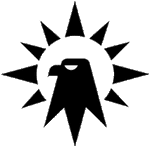
Symbol of Narikatonite Nationalism, one of the ideologies behind the Civil War.
While Narikatonites and Mainlanders shared the same ethnicity, their internal problems rooted from the two very different languages spoken by the population. During the Kingdom, Narik became the language of the nobless, as the monarchs and all other people with nobility spoke almost excluively in Narik, and the working classes of mainland spoke only Darnus. It was not uncommon for the local Earl or Baron to not understand his own people, which usually led to even stricter gap between the social classes.
After the abolishment of the Kingdom, the political balance remained in the islands, but both languages became acceptable in the nation. The disputes were finally put aside due to outside threats, as first the small minority of Lusitânians took over the country, and after them the Darnussian population was enslaved by the Deltarian Empire. These dark times united the population and made them forget their linguistical and cultural differences for the greater good. After the last outside invaders, the Fascist Hobrazians left, a new era started in the langugage field. Commonly known as Doressa-Era in Darnussian history, it refers to the shift of Darnussian politics from Merenbürg to Doressa, and it resulted also in the change of the langugages, as Darnus became the leading language.
After generations passed, the population started to forget the horrors they had been under, which resulted in the rise of the old disputes, now fueled by the nationalism that had risen during the opression. This saw the return of Narikatonite Nationalism as the Narikatonites started to require greater liberties for their language, which frustrated the Darnus-speakers. Many of the poorer mainlanders did not understand why their children had to study Narik in schools even though it was more then likely they would never need it in their daily lifes. Many protests were held against the language politics in poorer areas of the mainland, most notoriously in Red Stad, which resulted in counter-protests in the islands. Many people refused to speak in the other Darnussian Language.
Rise of Monarchism[]
Monarchism had always been more popular among the Island Population, as the Darnussian nobility had been the product of Narikatonites. Even though the official titles were stripped from the nobles, they still held count on who held the unofficial titles. The amount of the descendants of the old nobles among the families behind the large corporations was always high, but the new political atmosphere started to draw them into politics also, especially Darnussian Liberation Army. Among the rich corporation families such as the Af Ehjnhelm Family, a vast amount of Narik-speakers also entered the party. DLA, that had been formed by the poorest of the poor during the Hobrazian Invasion had slowly turned into a vessel for capitalism.
The old and rich noble families, or oligarchs as they were refered to before the war, started to fear for their economic wealth. Darnussia had been enjoying economic freedom for a century, but now socialist factions had started to rise, such as New Revolutionary Communist Party and Red Stad Communist Front. As DLA had turned into more elitist, the lower classes who had been relying on DLA before were now joining the ranks of the communists, which was a great threat for the oligarchs behind DLA.
After DLA decided to join the 2nd Hutori Civil War, it's ranks started to tear. Before, during the War of Luthori Succession, Robervou had stepped up against the monarchists, but now they were standing for the monarchy. Entire Darnussian Nation was going to participate in the war untill early elections were held and Jean-Paul Avenon was able to pull Darnussian Army out of the war. Many DLA volunteers stayed in to fight for the monarchy, most notably Alexander Darntus-Raux, the current heir of the Darnussian Throne and direct descendant of Darntus I himself. The monarchists got a new sparkel from the Hutori Civil War and started to put more pressure on DLA leadership. The Oligarchs saw monarchy as a way to protect their wealth against the rising communist threat. They wanted to place Alexander on the throne to rule once more as a monarch, but faced strong opposition from Anton Robervou and Jean-Paul Avenon, who were still extremely infuletial politicians among the DLA.
The War[]
Riots[]
The ongoing language dispute between the Narik-speakers and Darnus-speakers started to radicalize in late 2584 with the protest turning into riots. Narik-speakers were attacked and threatened in mainland, and many Darnus-speakers were driwen away from their homes in Nihaton. The Police was able to hold the peace for now, untill the news of Alexander Darntus-Raux's death in Hutori reached the country. Larger riots erupted in Merenbürg and DLA Whiteshirst aranged a large march in Doressa in his memory. The Darnussian Media, owned by the oligarchs of Narikaton, blamed President Robervou for his death. In February 2585, before the Independence Day celebrations, the national motto was changed to Fu' Die Albor, which was only in Darnus. This started an uproar in the islands, which eventually led to Robervou's assassination during his independence day speech. What shocked many was the fact that the shooter had been DLA Whiteshirt. Later historians believe that the Narikatonite Oligarchs might have ordered the hit on Robervou to egnite their coup, but no proof of that exists.
Independence of Narikaton[]
Robervou, the only man holding DLA's factions together, was dead. Joshua C. Mastertoni had already been the official leader of the party, and now after Robervous death, he became the true leader. The continuing riots in all larger cities led to a martial law, and as Minister of Defence and former general of the army, Mastertoni had strong contacts to the army. On the 16 of March 2585 the island's declared their independence from Darnussian Democratic Republic as Imperia Narikaton. Mastertoni, who himself was a Narikatonite Jew, set up Alexander's son, Anton, as the new Emperor of Narikaton. He was only 8 years old and easy puppet to control by Imperial Council, a body that was formed by the Narikaton Oligarchs and led by Joshua C. Mastertoni, who himself had inherited the title of Duke of Clenon.
Narikaton had everything, they had most of the armed forces, they had most of the wealth and they had stronger allies. Darnussian Democratic Republic was left to the communists. Those DLA-politicians who refused to join the Imperia Narikaton found new homes among the communists, even though many of them were suspected as spies of the Empire. The communist government was set up, and the People's Republic of Darnussia was declared 2 days later, and the remaining forces were mobilized.
Declaration of War[]
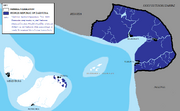
Situation in 2585 (See picture for details)
21st of March 2585 the People's Republic delcared war on Imperia Narikaton. Their plan was to strike fast against the leaders of the Empire as they believed that capturing and/or killing them would bring quick end to the conflict. Darnussian Paratroopers were sent to invade Merenbürg, the capital of the New Empire, but the plan backfired. The Imperial Navy, which basically had gained the controll of almost all ships of the old Darnussian Navy, responded quickly and shot down most of the planes. Some troopers got through, but they faced resistance in the outskirts of Merenbürg and they were killed or captured. The attack, which the government of Imperia Narikaton called "unprovoked", failed and resluted only in swerwe response from the Imperial Forces.
Imperia Narikaton reached out for Vascania, where the evicted monarch of Hutori and his supporters had fled to, and quickly gained the help they needed. The Islands were not as rescourcefull as the mainland was in terms of farmland, and the aid from Vascania was extremely imporant in feeding the population that was going to war. Vascania also sent soldiers to fight on Imperiums side.
The Endless Wait[]
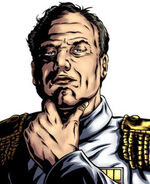
Kristoph Von Schmitt, ex-communist, veteran of the Hutori Civil War and the head of new Royal Imperial Army.
After the first attack had been repelled, Imperium answered with bombing raids, which eventually led to air warfare between the two fighting factions. As there were no land battles and only few naval clashes, the dogfights and raids became the only form of warfare for the time being. A famous Narikatonite poet, who was a member of the Imperial Army, later described it as "The Endless Wait", as they were eager to fight, but either side was not interested in starting a massive and costly landing.
During this wait, the communist factions took over the cities of Mainland Darnussia. Kozarian Freedom Army, Red Flag Pirates and other paramilitary organisations started to patrol the streets after some ex-DLA members started to fight against the communists in mainland. The paramilitary forces secured the most important parts of the infrastructure, as they feared they would be the target of possible terrorist attacks by Imperium's patrons. In Imperia Narikaton, all people who were believed to be Darnus-speakers were imprisoned in consentration camps, to work for the weapons manufactorers preparing for the possible invasion. Red Flag Pirates also oprated in Nihaton, staging terrorist attacks against the Imperial forces by guerilla tactics. They were however completely without help from the mainland as Imperial Navy made it impossible to send reinforcements for them.
Narikaton Imperial Front, the political party that was in command of the Imperia Nariakton, created their own paramilitary organisation that was placed under the command of Kristoph von Schmitt, the same man who had led the DLA dorces in Hutori Civil War, and an ex-member of the Red Stad Communist Front who had become a Nationalist. The remnants of the Darnussian Army in the islands was reformed into Royal Imperial Army, which was divided in Royal Imperial Navy, Royal Imperial Infantry and Royal Imperial Airforce.
The Axis Blockade[]

The War Situation in July 2585.
Imperia Narikaton became official member of the Axis Alliance, which resulted in massive assistance from the Axis. 200,000 Axis troops were sent to the islands, and Axis Navy organized a blockade of the mainland with the Royal Imperial Navy. The rising amount of troops in the islands resulted in Field-Marshall-Elect Richard Harisson planing for a counter attack against the Imperium. The Axis was possibly going to ship even more troops to the island, preparing for invasion of the mainland, so Harisson thought that the Communist Darnussia should attack first, before more troops would arrive. They started to conscript the population to join the ranks to prepare for landing on the islands.
After the suprising massive attacks by sea and air, the People's Republic attempted to start a landing on Nihaton, but it backfired as their ships were fought back by the Imperial and Axis Navies. As the blockade effectively prevented naval attacks at this point, the communists started a wider range of terror attacks against the infrastructure of the islands. The air and naval battles continued in the following months, and the casualties started to rise. Bombers, fighters and ships were lost on both sides. The People's Republic's government decided that they would not try to penetrate the blockade, and instead prepared for the possible landing in Kozaria.
The only place where gorund forces fought openly were the battles of Migrant's Islands, a group of tiny islands in the Migrant's Sea. Royal Imperial Army lost over 10,000 men in taking over them. The local population of the islands, whom many are Lusitanians, sided with the communists and fought effectively against the Imperial Forces, with only few losses. Later in his memoir, Von Schmitt stated that taking over the islands was "a waste of time, rescources and life".
Luthori Interference[]
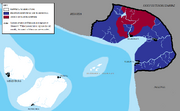
Steven P. Kennedy IV decided to interfere in the war in 2586, opening another front in the north. 600,000 Luthori troops crossed the border, which forced the Republic to restation their troops to defend the country in north. The paramilitary groups were no match for the Luthori Army, who we able to break deep into the mainland before having to face the official army of the People's Republic of Darnussia, which, in reality, was a rag-tag force made up of broken division's, unarmed volunteers and the elite "Civil Guard", which had remained loyal to the mainland. Luthori forces reached the city of Ghacrow quickly, and after days of intense fighting with the paramilitaries and official Darnussian army, they claimed victory. The loss og Ghacrow was also a huge strike to the Republican Navy, as Luthori forces were able to get their hands on several ships and one aircraft carrier, limiting the Republic's ability to defend itself from possible landing of the imperial forces.
Republican Forces aranged a massive bombing raid to Merenbürg, effectively destroying many historical buildings and new, high-rise office buildings. Imperium retaliated immediately with "Imperial Hammer", a new weapon arsenal of fatal thermobaric bombs that were considered to be the most destructive non-nuclear weapons of all time. Several hundred bombs were dropped and Doressa was completely destroyed.
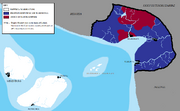
Communist Darnussia and it's paramilitary organizations responded quickly to the Luthori Invasion, effectively cutting the Luthori supply lines, stranding the Luthori forces to Ghacrow, where fighting was still going on on the streets. Luthori forces in the city became completely dependant of the supplies sent by the Imperia Narikaton through water. The Battle of Ghacrow turned into one of the bloodiest battlefields of the 26th century, with communist supporters and Luthori infantry basically shooting anything that was brave enough to move out on the streets of Ghacrow. Vascanian troops also landed into Ghacrow with Imperial Elite to assist the Luthori forces in keeping the city.
Imperial Invasion[]
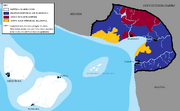
The long-awaited invasion of the mainland started in 2587, after two years of the endless fight. Attack began on the beaches of Kozaria, near the Malivian border, when 500,000 men landed after massive bombings by the Royal Imperial Airforce and Axis Navy. In the exact same time, another massive landing began in Kozaria, where another half a million men landed. As there were massive fighting in the middle-region of Alkavon, where communist forces faced off with the Luthori troops, both landings were success without heavy casualties.
Alkavon resistance started to crumble as 200,000 Axis Soldiers joined the invasion, totaling the Imperial forces in Alkavon Province to over one million men. Communist forces and paramilitaries were forced to withdraw, as Luthori, Axis and Royal Imperial Army soldiers had a victory after another. Aldurian forces arrived in Luthori, to prepare to join for the final attack against the communist forces in Alkavon. However, Alduria never participated in the war.
After arriving to Ghacrow to meet the men who had been fighting for months untill assistance finally came as the invasion begin, Steven P. Kennedy IV was assassinated by communist paramilitaries. After gigantic amont of casualties, the Republic started to look for possible peace with the Imperium, only to realize that they were not in a poistion to negotiate. Their end was near, unless they gained more assistance from somewhere. Kazulia had sent them 200,000 men, but they were not enough to defend the mainland from invaders.
Pan-Terran Red Army intervenes[]
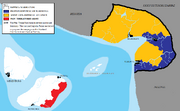
In 2588, the Pan-Terran Red Army intervened in the conflict, sending over one million communist paramilitary fighters to assist the dying People's Republic. PTRA forces landed on Nihaton and Clenon, which were unprepared for invasion after they had destroyed the Darnussian navy, effectively eliminating all possibilities on invasion on the islands. Axis and Imperial forces were no match for the invasion and they were forced to retreat into the western side of the island. PTRA:s and Cominterns interference stirred tha Axis, who started immediately to raise more troops from it's members.
Peace negotiations started in 2589, as many parts of the mainland were invaded by Imperial's and their allies, but as parts of Nihaton and Clenon were invaded by PTRA. It was a stalemate that either side did not wish to break at this point. However, these negotiations failed, and the war continued. Prince Henry, Duke of Zanyal Valley, Earl of Laloquon, became the commander of the Luthori forces, and the fighting continued in all fronts, but not as heavily as it had been before. Casualties were still coming, but no major advancements happened in the following months.
Hobrazia also prepared their forces at the northen border of Kozaria, as there were Hobrazian interest ongoing here. They crossed the border in 2591, having some combat with the Republican forces, but were withdrawn few months later by the new Emperor Elect Lionel Fields. Holy Imperial Allaince sent more supplies to the troops and people of the Imperium, and everything became more and more calm before the storm, as men were stuck in trenches and no massive combat was fought.
Imperial Victory[]
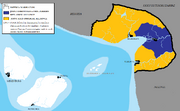
In 2593 the 2nd batch of negotiations started among the combatans, but fighting was still going on and there was no official ceasefire. The PTRA and Axis both pressured the both sides to negotiate for peace, because if the conflict would egnite to it's full scale again, the casualties would be heavy. As the negotiations did not go anywhere, the PTRA began to pull their forces, as they were needed in other places. This started a massive attack by the Imperial and Axis forces against the lost areas of Shirmania, along with continuing to push inland on the mainland, and they were victorious, but with a terrible cost: The Emperor of Imperia Narikaton, Anton I was killed in action during this attack, and his sister, Antoniette I, became the new Empress, along with up to 100,000 Imperial and Republican forces killed or missing in action.
In what was left of the People's Republic, with a heavily bombed Red Stad being the only city still under control of Lanzalotta's Communists (most of the People's Republic had been invaded by Imperial forces, or fallen to anti-communist-pro-republican paramilitaries), the RSCF had completely broken down. The "Cabinet of the People" was non-existent, and all of Lanzalotta's were increasingly concerned by Lanzalotta's totalitarian attitude. He threw whole armies into suicidal attacks, and had refused to listen to his generals, who were anxious for a armistace.
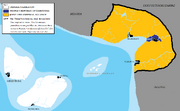
When he ordered the execution of a leader of a regiment of paramilitaries that lost a town to the Imperialists, he lost the support of even the most hardcore Stalinists. On 11 December 2598, with Imperial forces only 20 miles west of Red Stad, 500 heavily armed Communist paramilitaries stormed the residence of Lanzalotta and arrested him. The order for the action was ordered by Lanzalotta's second in command, Albert B. Rubenstein, a moderate Stalinist who was desperate to make peace with the Imperials. He called an election within the inner-ranks of the RSCF for a leader, and he won. By the 24 December, he had managed to make the Imperials aggree to a cease-fire in the Christmas Eve Truce. On the 26th, Lanzalotta was shot dead by RSCF officials.
Until March 2599, the People's Republic still existed under Rubenstein, who used all of his efforts in negotiating with the Imperials. On the 21 March 2599, 14 years to the day of mainlands decleration of war, the official conditional surrender document was signed, ending the war.
Aftermath[]

Union Flag.
3,200,000 Darnussians and Narikatonites died during the war, with over a half of them unarmed civilians. The new nation that was introduced after the war, The United Republic of Narikaton and Darnussia, was partial monarchy, where Grand Duchess Antoniette I ruled as a monarch of the islands, while the entire nation was ruled by the Parliament and strong Union President. The First Union President elected was Joshua C. Mastertoni.
Axis Alliance and Luthori were both allowed to build military bases in the Islands, to ensure the stability of the United Republic and the fact that the communists would not be able to destroy the partial monarchy after their troops would have left. Merenbürg became the capital of the nation once again, as it had been before the Deltarian Invasion, and the Doressa Era officially ended. Red Stad Communist Front and Kozarian Freedom Army were banned and some of their members were persecuted as war criminals.
The United Republic however, would eventually fall in just few decades and become the Empire of Narikaton and Darnussia, ruled first by Empress Antoniette I, and later by his Imperial Viceroy, the notorious Claude Deimore, who himself had fought in the last days of the civil war. The transition to the empire would not have been possible without the outcome of the civil war and the hatered and dislike it left behind.
Alleged Warcrimes[]
There has been accusations of Warcrimes commited by both sides during the war by official and unofficial examinations.
- The Marbello Massacre, (August 2585). During the bloody invasion of Migrant's Islands, Imperial and Vascanian forces reportedly gathered the Lusitanian women, children and elderly of the town known as Marbello and massacred them in revenge for their heavy losses against the Lusitanian Guerillas. The event was fueled by the decades old hatered towards Lusitanians. 2500 bodies were found buried in a mass-grave in 2645.
- Clensing of Red Stad, (March 2585 - July 2585). Operation was ran by communist paramilitaries with them aiming to find, capture and eliminate many of the former followers of the now disbanded Darnussian Liberation Army. During the Red Stad trials of 2899 several ex-communistes were sentenced for these crimes. It is believed over 3000 people were murdered by the communist paramilitaries on the belief that they had once voted for DLA.
- Inhumane treatment of communists and Darnus speakers in Imperia Narikaton. The Imperial Government ordered the detaining of many Darnus-speakers and communists living on the mainland a day after the mainlanders had attacked Narikaton. Over 45,000 civilians were detained and sent to labour camps, and it is believed atleast 1500 died during the first five years of war. Labour camps were shut down by orders of the Imperial Government in 2590 and they became detainee camps with much better conditions.
- Battle of Ghacrow, (2586 - 2587). One of the bloodiest battle of the war was fought in the streets of Ghacrow between Luthori and communist forces. Civilian casualties in the city rised above 100,000 as both sides regularily shoot anything that moved on the streets, be it women, children or enemy soldiers. No official investigation was ever set up by the future governments of Darnussia.
- Month of Revenge, (August 2591). Month of Revenge was series of massacres in communist prison camps commited by communists forces under the orders of Norman Lee Lanzalotta. It is estimated that 50,000 Imperial, Luthori, Axis and Vascanian prisoners of war were executed during that month. Lanzalotta was posthumous sentenced to death for these crimes.
- Carpet Bombing of Doressa, (2586), was a series of air-raids commited by the Royal Imperial Airforces of Narikaton, aiming the capital of the mainland, Doressa. The number of civilian casualties remained low, 4000, but the entire city was wiped out by the bombings.
- The Communist Reordering, (11 December 2598 - 21 March 2599), was a series of political murders and executions commited by the communists within their own ranks. 5000 high ranking officials were imprisoned and over 1000 were shot by the communists in purges that made the peace-treaty possible. One of the victims was Norman Lee Lanzalotta, one of the leaders of the communist factions of mainland. None of the communists involved in the purge were charged for the murders by the United Republic.
